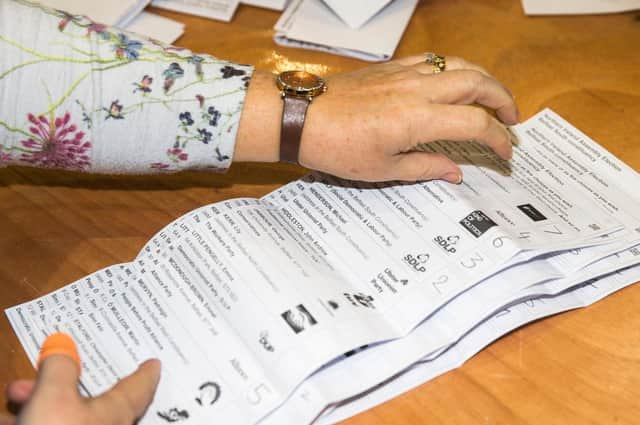Ben Lowry: For maximum say in PR elections, vote right down the ballot paper


They are not referring to the many voters in the east of Northern Ireland, whose cultural background is what you might loosely call ‘unionist’, and who are notoriously reluctant to vote for unionist parties, or indeed to vote at all.
They are referring to people who are more emphatically unionist than that, and yet who are still choosing not to vote.
Advertisement
Hide AdAdvertisement
Hide AdOne pundit told me that this failure to vote had cost them North Belfast in the 2019 general election (when the incumbent MP Nigel Dodds lost to John Finucane).
Such an analysis should, I think, be treated with caution. After all, the turnout in North Belfast that year was 68% of the electorate, higher than normal in that seat.
The turnout would have needed to be boosted by another 3%, and almost every one of those extra voters would have needed to cast their vote for Mr Dodds, to overturn Mr Finucane’s majority 2,000 majority.
But the people who say this (about unionist voters who stay at home) do have their ear to the ground in loyalist communities. Perhaps they are right.
Advertisement
Hide AdAdvertisement
Hide AdIt has never been more important that they go to the polls, and register opposition to the Northern Ireland Protocol. A small unionist vote, of around or slightly over 40%, will be gleefully interpreted by Irish and EU politicians as support for the Irish Sea border.
So unionists should register their opposition to the way in which the Act of Union has been partially repealed, and the principle of consent under the 1998 Belfast Agreement greatly diminished.
After all, if you can exercise consent so that NI stays in the UK, but fundamental aspects of nationhood can be withdrawn (such as unfettered internal trade) without such consent, then membership of the UK can be hollowed out in other ways, while leaving us technically still within it.
In this election I recall someone I greatly admire who voted Alliance through his life and never voted unionist, such was his dislike of unionist politicians, except on one occasion — he voted for one of the unionist MPs who resigned in protest after the 1985 Anglo Irish Agreement and then stood again for Westminster in the resulting by election.
Advertisement
Hide AdAdvertisement
Hide AdToday, there must be such people out there who do not support mainstream unionist parties but who are outraged by the protocol.
But there is something else that unionists should do in this election — vote all the way down the ticket.
I have been covering election results for more than two decades, and have reported on cliff-hanger results in which the last Stormont seat was decided by a few votes.
It is surprising to me how many voters, across the spectrum, do not vote down the ballot paper.
Advertisement
Hide AdAdvertisement
Hide AdThey might be staunchly loyal to one party and vote for all the candidates from that party, and then refuse to transfer at all, even to candidates from the party closest ideologically to their preferred party.
They might, for example, vote DUP 1, 2, 3 and stop there. Such voters are, in effect, saying that they consider all the remaining candidates to be equally bad.
There are also unionist voters who give preferences to all the unionist candidates on the ticket, and then leave other candidates blank.
That means that they are treating the Sinn Fein candidate and the Alliance candidate the same. Thus, if it comes to a final seat between two candidates from those parties, perhaps on a 10th count, the voter who has expressed no preference between the two remaining candidates will have no say. Their vote will be non transferable.
Advertisement
Hide AdAdvertisement
Hide AdMany unionists are angry with Alliance, and feel that on most key issues it sides with nationalist parties. But it is remarkable if they allow such anger to reach a level where they do not care whether SF or Alliance get a last remaining Assembly seat in a constituency.
Ever since I first voted in a proportional representation election that uses the Single Transferable Vote system (of listing your preferences 1, 2, 3, 4, etc) I have voted all the way down the list, until I leave the candidate I like least blank.
Sometimes, as I descend down the list, I give high preferences to politicians I admire, but who belong to parties I do not. The reason being that I never know when my ballot paper and its preferences will prove critical in deciding a last seat. As none of us do.
l Ben Lowry (@BenLowry2) is News Letter editor
l Ben Lowry: Fond memories of my former editor Jim Flanagan
l Ben Lowry April 16: Boris Johnson is under-estimated by his enemies
Advertisement
Hide AdAdvertisement
Hide Adl Ben Lowry April 9: Even if Article 16 is not triggered London knows that the NI Protocol is a huge problem
l Ben Lowry April 2: Three things to look out for in the coming election
l Aileen Quinton: Joe Brolly’s remarks are the issue, not his GAA background